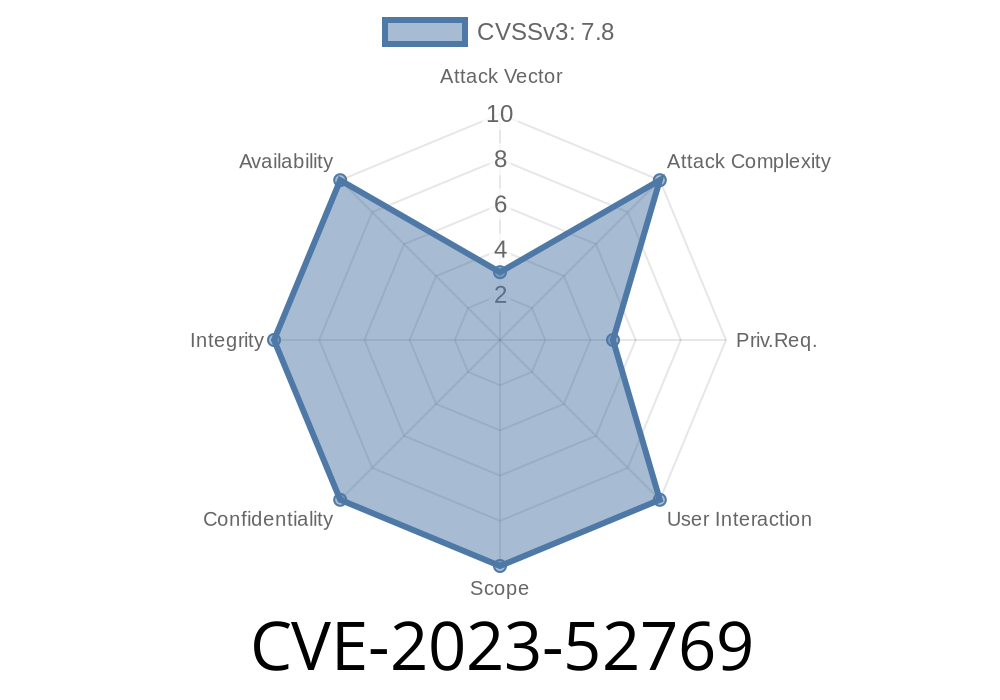The world's computers and devices depend a lot on the Linux kernel. When a vulnerability is found in how drivers interact with wifi chips, millions could be affected. Today, we take a close look at CVE-2023-52769, a bug most Linux users have never heard of, but one that matters to anyone who wants a safe and stable wireless connection.
We'll break down what really happened, check out actual code, and discuss the implications — all in plain American English.
What is CVE-2023-52769 About?
CVE-2023-52769 popped up in the Linux kernel's wifi subsystem, specifically in the ath12k driver. This is the bit of code that Linux uses to talk with certain Qualcomm Atheros wireless cards (the ones marked "ath12k").
The problem? The driver was handling certain event notifications — specifically related to "htt mlo-offset" events — without protecting shared data from being changed at the wrong moment. That left a door open for something called a use-after-free bug. It's the kind of bug that bad actors love, because if they time things just right, they might crash your wifi or even find a path to run unwanted code.
The ath12k driver tracks many "physical devices" (pedvs) so it can manage wifi radios.
- Linux uses a system called RCU (Read-Copy-Update) to safely let many things look at this device information at the same time.
- The htt mlo-offset event code was peeking into the shared device list — but it wasn’t following the RCU safety rules.
- Without those rules, Linux couldn't guarantee that the data wouldn’t change or disappear right under its nose (boom: use-after-free).
The Actual Patch: How Did They Fix It?
The maintainers fixed it by marking the offending code with RCU’s “read-side critical section.” This is just a protective wrapper, but it makes a big difference.
Before Patch (buggy version):
struct ath12k *ar = ath12k_mac_get_ar_by_pdev_id(ab, pdev_id);
// ...use ar, but not under RCU protection!
After Patch (fixed version):
rcu_read_lock();
struct ath12k *ar = ath12k_mac_get_ar_by_pdev_id(ab, pdev_id);
// ...use 'ar' safely
rcu_read_unlock();
These two extra lines, rcu_read_lock() and rcu_read_unlock(), tell the kernel to keep things stable until it’s done.
Reference commit:
- Kernel Patch Commit
- CVE Record
What Could Attackers Do With This Bug?
This vulnerability is less about remote hacks and more about local stability. If a process with the right privileges poked at the wifi subsystem while this bug existed, it could have:
Made wireless devices unusable until reboot
- In theory, created a pathway for more advanced attacks (like privilege escalation), but this depends on other circumstances and is harder to pull off
Who Should Care and What To Do
If you use Linux on a machine with ath12k-based wireless hardware (often Qualcomm chips in newer laptops, access points, or IoT devices), pay attention:
Update your kernel: The fix is included in Linux 6.8 and later (and some backports).
- Check your dmesg/syslog: If you saw strange wifi drops or panics, this bug may have been the cause.
Learn More
- ath12k WiFi Driver Source Code (in kernel)
- Introduction to RCU (LWN.net)
- Linux Kernel Documentation: RCU
Final Thoughts
CVE-2023-52769 is a classic example of how small mistakes in locking and synchronization can have big impacts, especially in code as widely used as the Linux kernel. Thanks to fast work from the developer community, the window for attackers was closed quickly.
Keep your systems patched, and thank the folks who fix the bugs before most of us even hear about them.
Have questions or want more wifi security deep-dives? Let us know in the comments or message us!
*Written by a Linux kernel enthusiast — exclusive breakdown for your security peace of mind.*
Timeline
Published on: 05/21/2024 16:15:16 UTC
Last modified on: 05/29/2024 05:17:02 UTC
